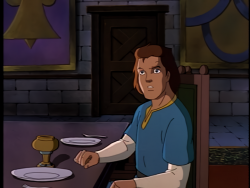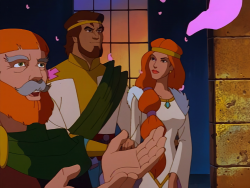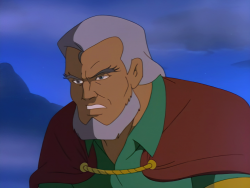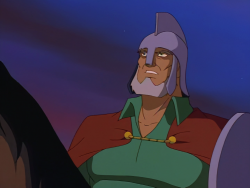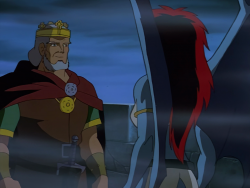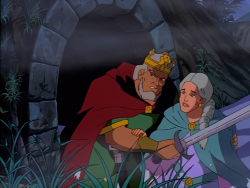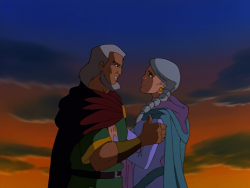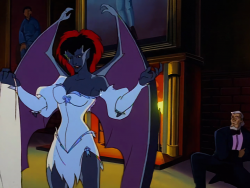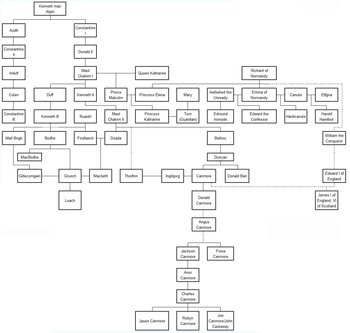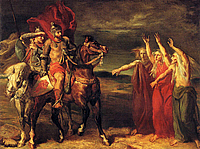Macbeth
Macbeth mac Findlaech is the immortal human magically linked to Demona. He was the King of Scotland from 1040 to 1057.
Contents
History
Early life
Macbeth was born in the year 1005, as the son of Findlaech, High Steward of Moray, by Doada, a daughter of Maol Chalvim II of Scotland. [1][2][3] This made him of royal birth, with connections to the throne strong enough to disturb his cousin, Prince Duncan. In 1020, Duncan decided to remedy this by sending Gillecomgain the Hunter to Castle Moray to assassinate both Findlaech and Macbeth. ("City of Stone" Part One)
However, Macbeth had been recently brought to the Weird Sisters' attention by the Archmage, with instructions to watch over both him and Angel. ("Avalon" Part Two) The Sisters thereby arranged for Angel to come to Castle Moray and save Macbeth's life from Gillecomgain, although Findlaech was slain, thus beginning their alliance. Duncan awarded the title of High Steward of Moray to Gillecomgain, dispossessing Macbeth (who, without his father's patronage, no longer seemed a threat to him).
In 1032, Duncan, having decided that Macbeth was still a threat to his claim to the throne (and that of his new-born son Canmore) ordered Gillecomgain to assassinate Macbeth as well. When Gillecomgain refused, Duncan told Macbeth that Gillecomgain was Findlaech's murderer, which motivated Macbeth to move against Gillecomgain at once. (It helped also that Gillecomgain had taken to wife Macbeth's long-time love, Gruoch, against her will). The Weird Sisters arranged for Macbeth and Angel to fight against Gillecomgain together and defeat him. After Gillecomgain's death, Macbeth became High Steward of Moray and married Gruoch. He also became father to Gruoch's son Luach, although it remains uncertain as to whether Luach's biological father was Gillecomgain or Macbeth. ("City of Stone" Part One, "City of Stone" Part Two) [4]
King of Scotland
In 1040, the Sisters intervened in Macbeth's life again, prophesying before Duncan that Macbeth would someday become King of Scotland. Duncan, his suspicions reawakened, moved against Macbeth at once. Macbeth's own forces were outnumbered, and so in desperation, he sought help from Angel, who was herself being attacked by Duncan and his followers. Angel was initially reluctant to remain Macbeth's ally, until the Weird Sisters stepped in and offered to rejuvenate Angel if she would accede. They transferred Macbeth's youth to her, with his consent, and in the process, magically bound the two of them together for the rest of their lives. With the aid of Demona's Clan, Macbeth overthrew and slew Duncan in battle, and was crowned High King of Scotland upon the Stone of Destiny. He promptly made peace with the gargoyles, gave Angel the name Demona and appointed her his primary advisor. ("City of Stone" Part Three)
For seventeen years, Macbeth ruled Scotland in peace, and both humans and gargoyles thrived under him. During this rare period of stability in Scotland, Macbeth made the journey to Rome to meet the Pope. [5] Unfortunately, this last golden age of peace between scottish humans and gargoyles would not last. In 1057, Duncan's son Canmore made common cause with the English, and invaded Scotland to regain his father's throne. When Macbeth's father-in-law Bodhe urged Macbeth to cast off his alliance with Demona in order to remove the English's supposed reason for invading Scotland, Macbeth listened patiently; when Luach protested his father's willingness to hear Bodhe's words, Macbeth replied that "A wise king considers all his options, and then makes his choice." Unfortunately, an eavesdropping Demona interpreted Macbeth's response as a sign that he was planning to betray her, and so deserted him in anger. Thanks to the desertion of Demona and her clan, Canmore was able to easily sack Castle Moray. When Macbeth and Gruoch escaped the castle, Canmore and Demona both confronted them; while Macbeth angrily berated Demona for betraying him, Canmore stabbed him in the back. Both Macbeth and Demona were temporarily slain, and Gruoch, Luach, and Bodhe all believed Macbeth to be genuinely dead. Bodhe declared Luach the new King of Scotland, and the two men left to continue the war against Canmore, leaving Gruoch alone with her husband.
Exile
The Weird Sisters awakened Macbeth and Demona, and told them the terms of their link to each other, revealing that they were now immortal unless and until one slew the other. Macbeth wished to continue the fight against Canmore, but Gruoch persuaded him that his return from the dead would appear to verify Canmore's accusations that Macbeth was involved in sorcery, and urged him to leave Scotland, for Luach's sake. Macbeth sadly parted from her, never to meet her again, and began the life of a lonely wanderer. ("City of Stone" Part Four)
Over the centuries he pursued Demona, first to gain revenge upon her, but increasingly to find release for himself from his unwanted immortality. Macbeth has grown weary of his long life, and he knows that the only way for it to end is for he to slay Demona - or she to slay him. With no way to escape in sight, Macbeth likely spent many years drunk. He and Demona have encountered each other many times over the centuries, but never managed to bring their feud as yet to a definite close. [6][7] Macbeth may have also ran into descendants of the Canmore family over the centuries, but it remains uncertain if they were fully aware who Macbeth was. [8][9][10]
After enduring more than three hundred years, Macbeth found purpose once more when he fought the English and defended his homeland (fighting alongside even Robert the Bruce) at the Battle of Bannockburn in 1314. ("Rock of Ages")
Around 1606, Macbeth's life-story became the subject, in a highly distorted form, of William Shakespeare's tragedy Macbeth, which has since become regarded as one of his greatest plays. Macbeth, who knew Shakespeare well - though did not reveal his true identity to him - was amused rather than offended by the play. [11][12]
Greg Weisman has said that Macbeth first came to America before it was called America. [13]
During World War II, Macbeth fought on the side of the Allies. [14]
On Christmas Day in 1950, Macbeth participated in the theft of the Stone of Destiny from Westminster Abbey, alongside four Scottish students. ("The Rock") His compatriots inadvertently broke the stone in half during the theft; the following year, Macbeth tried mending the Stone at Arbroath Abbey, when it mended itself and spoke to him, revealing its true nature. ("Rock of Ages")
Old Grudges
By the 1990s, Macbeth had taken on the alias of Lennox Macduff, a medieval scholar. When he learned about Goliath and his clan, he came to New York. Shortly before Xanatos's release from jail, Macbeth, disguised as a corrections officer, approached Xanatos and offered to remove the gargoyles from Castle Wyvern for a price, he assumed that offering to do it for free would have made Xanatos suspicious; his hope was that Demona would come to their rescue and give him the opportunity for a final encounter. He was disappointed to discover from Goliath that Demona had become the clan's enemy and was uninterested in rescuing them; in the battle with Goliath, Macbeth's New York mansion was burned down, but Macbeth escaped. ("Enter Macbeth")
Not long afterwards, Macbeth stole the Scrolls of Merlin when they were brought to New York, presumably hoping to use their magic against Demona after testing the spells on Broadway who he had captured. When he discovered that they contained Merlin's memoirs rather than his magical secrets, however, he let the gargoyles take them back and leave. ("A Lighthouse in the Sea of Time")
Macbeth finally had his longed-for encounter with Demona not long afterwards, when she placed her "stone by night" curse upon New York. Before the two of them could fight each other to the death, however, the Weird Sisters intervened, persuading the two (with some help from Goliath) not to slay each other. ("City of Stone" Part Four)
Afterwards, the Sisters whisked Macbeth and Demona away, placing them under their control and having them steal the Grimorum Arcanorum, Eye of Odin, and Phoenix Gate from the Clock Tower, so that they could give these to the Archmage. ("High Noon")
Keeping Demona and Macbeth under their control, the Sisters made them attack the gargoyles upon Avalon, but King Arthur Pendragon defeated Macbeth in single combat. Goliath forced the Weird Sisters to release Demona and Macbeth from their control afterwards, and then sent them away from Avalon. ("Avalon" Part Three) Avalon sent them both to Paris, where Demona and Thailog together tricked Macbeth, under the alias Lennox Macbeth, into marrying Demona in her human form as Dominique Destine. They had different motives for this; Demona hoped to gain Macbeth's fortune and add it to her own, while Thailog hoped to trick Demona and Macbeth into killing each other so that he could gain all their combined wealth. However, Goliath and his companions thwarted this scheme when Avalon sent them to Paris on the Avalon World Tour. ("Sanctuary") After learning of the deceit, he quickly annulled his marriage to Dominique. [15]
New Purpose
Macbeth returned to New York afterwards, whereby using a Will-O-The-Wisp, learned about King Arthur's quest for Excalibur, and decided to claim the magic sword for himself. Macbeth, along with Banquo and Fleance, battled Arthur, Griff, Hudson, and the trio for the sword. In the end, however, it was Arthur who recovered Excalibur from within the animated stone dragon. The Once and Future King held no grudge against Macbeth, however, and offered to take him into his service. Macbeth was too independent to become one of Arthur's followers, but was willing to act as his ally instead. ("Pendragon")
When the gargoyles were revealed to the world, Macbeth appeared on Nightwatch in his Lennox Macduff role, and supported the clan, urging the humans of New York to make peace with the gargoyles and debating vehemently against Margot Yale, who wanted them locked up. ("The Journey")
In November 1996, Macbeth enlisted the help of the Manhattan Clan (specifically Hudson and Lexington), in ensuring the Stone of Destiny would be safely transported from Westminster Abbey in London back to Scotland. He took the two gargoyles to London and there again encountered King Arthur. Despite their past history, Macbeth and Arthur got along well together. The two of them having much in common, they traded stories over Nightstone's Coffee. ("The Rock", "Rock & Roll")
Macbeth and Arthur stood vigil over the Stone, even traveling to the Coldstream Bridge while Coldstone and Coldfire battled Coldsteel and Coyote 5.0. After that battle was over, Macbeth was satisfied that the Stone has returned to Edinburgh, although he would have preferred it in Scone. But, Macbeth and Arthur were none the wiser that Xanatos switched the Stone with a replica. Not that it mattered. ("Rock of Ages")
It is likely that Macbeth will be "a bit" involved during Arthur's quest to retrieve the Holy Grail. [16]
By 2198, Macbeth will still be alive, but retired from the world for a time; he will not immediately involve himself in the events of that period following the Space-Spawn invasion. [17][18]
Characteristics
Macbeth is comfortably wealthy, although no match for Xanatos. He has at least two mansions, one in New York and another in Paris on the Left Bank, plus a town house at Berkeley Square in London. He also has access to a great deal of high-tech equipment and has even studied a fair amount of magic over the years. For a while he had the service of two mercenaries, named Banquo and Fleance, who even know his true identity; they have currently left him to serve John Castaway instead, however. Macbeth is a medieval scholar and is also the author, as "Lennox Macduff", of Gargoyles In Celtic Legend and has attended multiple universities over the centuries. [19][20] He occasionally works as a stage actor and typically works in Shakespearean plays. [21]
Macbeth has a sense of honor. He will not attack the gargoyles while they are trapped in their stone sleep, but will readily battle them while they are awake if he feels it is necessary. He is aware of the gargoyles' true nature, and will not support anti-gargoyle activity of the Quarrymen variety (as his appearance on Nightwatch made clear). He may even be an ally of a sort to them, although in the end, he acts on his own most of the time. The truth of the matter is, he is simply tired of living for so long, and yearns for release from his undesired immortality. Or so he believes; recent developments have made it possible that he can find some way of recovering a sense of joy in life.
Spiritually, Macbeth leans towards Christianity with Pagan overtones. [22]
Appearances
- "Enter Macbeth" (First Appearance)
- "A Lighthouse in the Sea of Time"
- "City of Stone" Part One
- "City of Stone" Part Two
- "City of Stone" Part Three
- "City of Stone" Part Four
- "High Noon"
- "Double Jeopardy" (Mentioned Only)
- "The Price" (Mentioned Only, Impersonated By Macbeth robot)
- "Avalon" Part Two (No Lines)
- "Avalon" Part Three
- "Sanctuary"
- "Pendragon"
- "Nightwatch" (No Lines)
- "The Journey"
- "The Rock"
- "Rock & Roll"
- "Rock of Ages"
Real World Background
Macbeth was a real King of Scotland between 1040 and 1057, whose life happened pretty much the way that it did in Gargoyles, minus his involvement with Demona and her clan, of course. Contrary to the popular picture of him painted by William Shakespeare, Macbeth was actually a good king rather than a tyrant; he was noted not only for wise government, but also for making a pilgrimage to Rome in 1050 upon which occasion he distributed much largesse to the poor. His dealings with the Weird Sisters are traditional legend, first appearing in Holinshed's Chronicles, Shakespeare's leading source for his play.
The blackening of Macbeth's character and reign in Shakespeare seems to have originated from two reasons. First, the "history is written by the winners" principle; Malcolm Canmore had overthrown Macbeth in 1057, and he and his descendants ruled Scotland thereafter, and, after James VI's accession to the English throne in 1603 as James I, England as well. With James I as his king, Shakespeare obviously had to slant his story as much in favor of Duncan and Canmore and against Macbeth as possible. (Also, James and his Stuart ancestors believed themselves to be descended from the mythical thane Banquo, who was said to have been murdered by Macbeth.) Second, Shakespeare also seems to have wanted to write a play about the horror that comes from achieving one's goals through evil means, which gave him artistic as well as political reasons for darkening Macbeth's character.
Gargoyles is not the only Disney property to feature Macbeth. Don Rosa's The Life and Times of Scrooge McDuck (Gemstone Publishing: Timonium, Maryland, 2007) depicted Sir Quackly McDuck, one of Scrooge's ancestors, as giving shelter to Macbeth in Castle McDuck "durin' the civil war of 1057"; Macbeth rewarded Sir Quackly for his services with a chest of gold. Unfortunately, Sir Quackly, while hiding the chest in his castle, accidentally walled himself up with it (thus allowing Macbeth's enemies to capture him).
Interestingly enough, "Macbeth" in Gaelic means "Son of Life", a very appropriate name for the Macbeth of Gargoyles.
Production Background
Voice Actor: John Rhys-Davies. Young Macbeth: Jeff Bennett.
Originally Macbeth was suppose to function as Gargoyles version of Marvel Comics's Kraven the Hunter. He ended up being more similar to a certain Caped Crusader. [23]
See Also
- Macbeth (Gargoyles) at Wikipedia, the Free Encyclopedia
- Macbeth of Scotland at Wikipedia, the Free Encyclopedia

